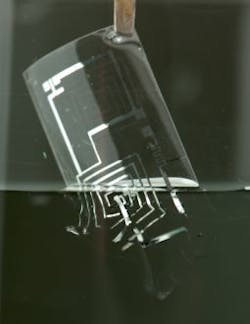This blog will self-destruct: DARPA’s vanishing electronics initiative
DARPA’s latest initiative involves the development and manufacturing of electronics, including those for remote sensing and communication, which will be able to self-destruct on command (Think Mission: Impossible, or even Inspector Gadget.)
In the "Vanishing Programmable Resources (VAPR)" program, IBM was awarded a $3.5 million contract from the government to develop electronics that utilize strained glass substrates to shatter attached CMOS sensor chips into biodegradable powder. The FBO award notice says that a trigger, such as a fuse or a reactive metal layer, will be used to initiate shattering and an external radio frequency signal will initiate the self-destruction of the unit.
A DARPA page dedicated specifically to the VAPR program says that the reasoning behind the project is that large number of electronics are often distributed for communication and monitoring, but it is “nearly impossible to track and recover every device,” which can result in the wrong person getting their hands on potential sensitive intellectual property and information. Essentially, these transient electronics will work the same as their conventional counterparts, but at any point, could be destroyed, leaving them to degrade into their surroundings, rendering them useless.
DARPA has already created transient electronics that vanish in water, with the idea that an injured solider can swallow the device after an injury and it will kill dangerous bacteria, fight infection, and be absorbed harmlessly into the body.
These electronics, DARPA suggests, could be used for environmental monitoring and simplified diagnosis, treatment, and health monitoring in the field. Now, the idea and purpose of these electronic devices are clearly defined and will quite obviously serve a very specific and important purpose…but if you are a manufacturer of, let’s say cameras, are you going to want to build something that could so easily (and intentionally) be destroyed?
I suppose the answer would be a definitive yes, considering the impact and importance of their use, not to mention the $3.5 million check. But still a thought that could come up (well, in my mind anyway.)
And more thought, to leave you with: On the topic of “vanishing electronics,’ I’m guessing that maybe there are a few officials in Russia that may want to consider their use to avoid (further) media scrutiny, based off some of the latest reports out of Sochi.
About the Author

James Carroll
Former VSD Editor James Carroll joined the team 2013. Carroll covered machine vision and imaging from numerous angles, including application stories, industry news, market updates, and new products. In addition to writing and editing articles, Carroll managed the Innovators Awards program and webcasts.
